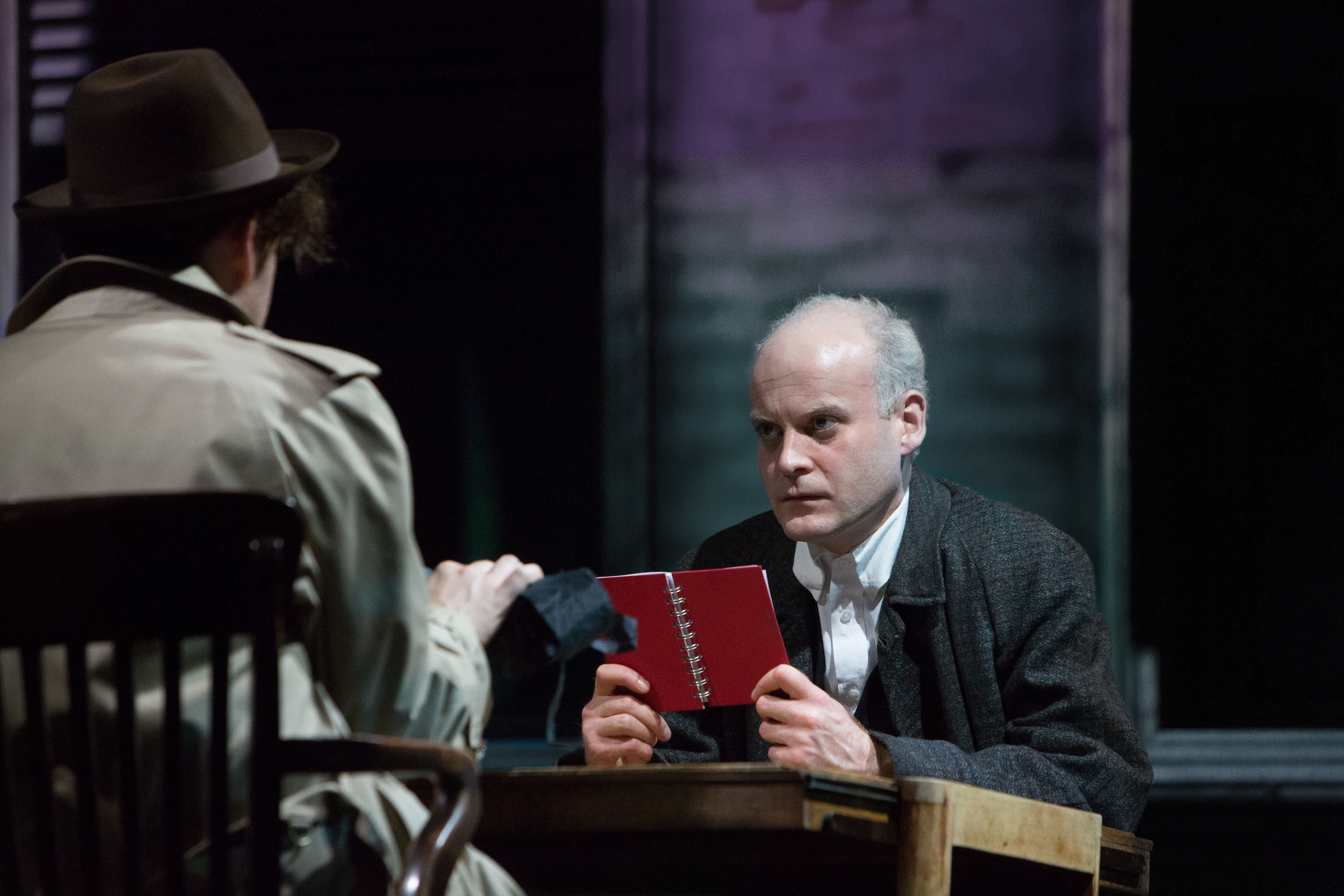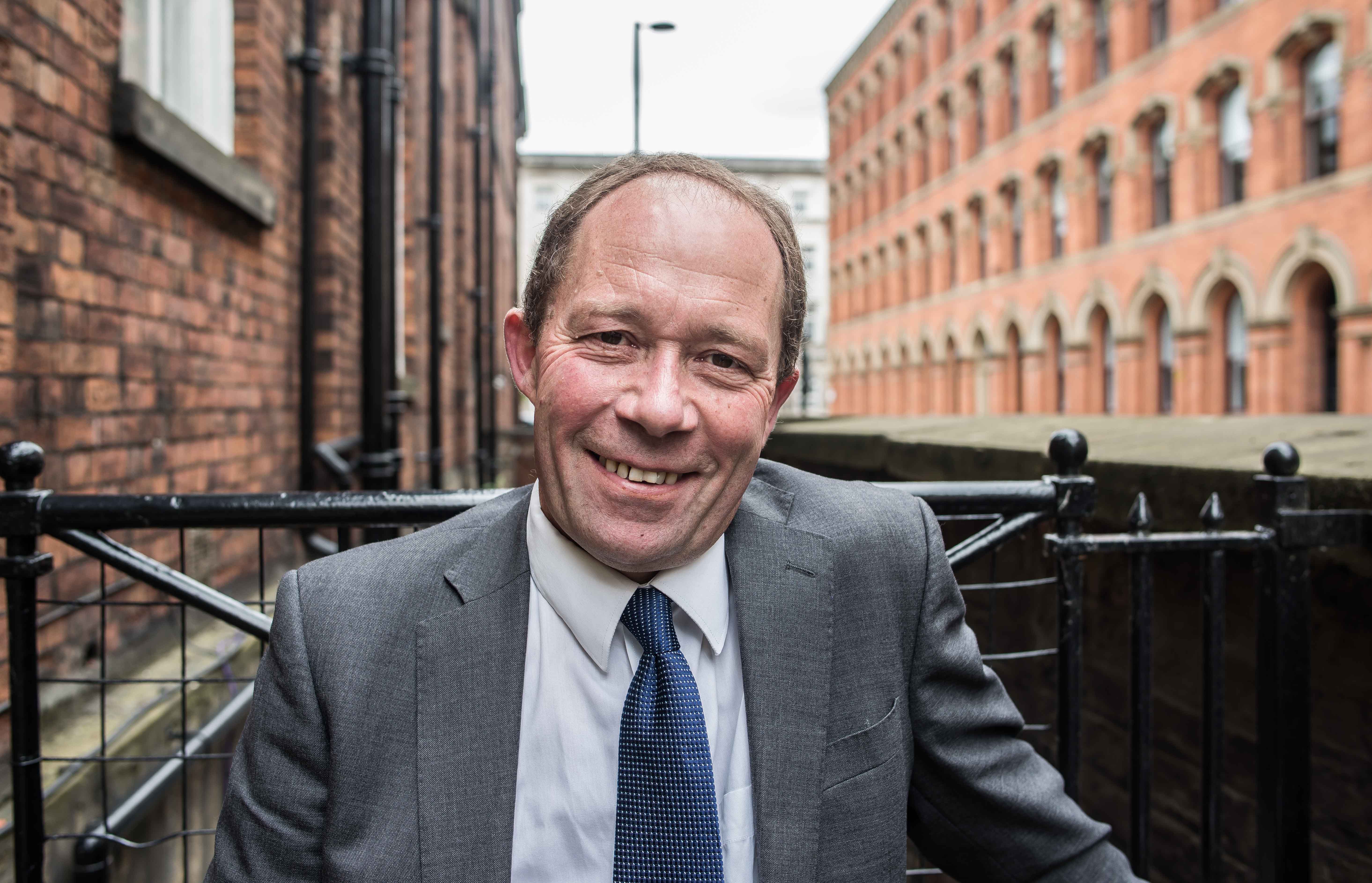No matter how old we get, there’s something about public nudity that can still shock and amuse. I’m not talking about witnessing a drunken streak through the streets of Manchester, rather the world premiere of Paul Auster’s first novel in The New York Trilogy, his City of Glass at Manchester’s HOME.
From the outset, we’re warned that 59 Production’s adaptation will contain a bit of flesh – as well as a smidge of swearing and enough strobe-lighting to give Ibiza super-clubs a run for their money. Still, I don’t think you’re ever prepared for an actor’s tackle to be illuminated by a bright spotlight for all to see.
As the actor shuffles on stage – shoving his clothes through a window and out onto the New York street below – there’s a distinct shout of “oh my god” from a woman seated behind me. It’s not gratuitous nudity, it’s integral to the story and, particularly during a later scene where the cosmos is projected onto the back-drop, quite beautiful. The character is clearly suffering a mental break yet for some it prompts that initial surprise.
City of Glass follows crime writer Daniel Quinn as he receives a mysterious call from Peter Stillman, requesting the help of private detective, Paul Auster. Stilman Jr was locked in a dark room for nine years, without company or language, by his academic (and insane) father. After initial hesitation, Quinn takes on the case and assumes the identity of Auster, which sends him down a path of fake and broken identities, following a bunch of clues that make no sense.
 I must admit, I’ve always been a bit confused by the narrative but I think that’s Auster’s point. The story is difficult to pin down on the page, and this remains the case onstage. Its about fragmented language, authorship and writing, mixed with the more traditional detective story. As reaffirmed by the narrator during the final scene, it’s supposed to keep us guessing. We’re never ‘quite sure’ about what’s going on.
I must admit, I’ve always been a bit confused by the narrative but I think that’s Auster’s point. The story is difficult to pin down on the page, and this remains the case onstage. Its about fragmented language, authorship and writing, mixed with the more traditional detective story. As reaffirmed by the narrator during the final scene, it’s supposed to keep us guessing. We’re never ‘quite sure’ about what’s going on.
As Quinn follows Stillman’s father around New York, mapping out his movements and then engaging with him in bizarre conversations (Humpty Dumpty as a metaphor for humanity – who’d have thought it?) he begins to unravel, losing himself in both the narrative and the city.
The most impressive part of this performance is the special effects. The use of lighting and projection transports the audience through Quinn’s physical and mental journey. Light is used effectively, with a border of bright bulbs framing the stage, almost blinding us between scenes. It gives the actors time to move about, swapping positions and props, but also leaving us feeling bewildered. As Quinn scribbles in his red notebook, his words are not only spoken aloud, but written on the walls, offering us a glimpse into the fractured psyche of a man battling with his grief and identity. 
The production was influenced by the City of Glass: The Graphic Novel by Paul Karasik and David Mazzucchelli, and I wondered how they’d be able to capture that gritty essence, but Duncan Macmillan seems to have it pretty spot-on.
Staging is effortless. Split into two compartments, the space is used well. The busy streets of New York are seamlessly turned into an apartment building, a café, a railway station, dingy alleyways. Books become photographs. Posters become story footage. Skyscrapers burst from the floor. Shadows walk the stage as people, or circle in gentle strokes, cleverly mimicking a fan in a city thoroughfare. Everything flows.
At one point, I become so immersed with what’s taking place on stage that, for a moment, I forget where I am (adopting what Housemate calls her “ever-fetching mouth-gaping TV face”) and so when a voice from somewhere behind me hisses, “can you please be quiet” at someone in the audience, I physically jolt, worried she’s reprimanding me. The story really messes with your head.
The acting was fantastic. With a cast of only six, and an enormous amount of dialogue between them, they did an incredible job of bringing the story to life. By only using a small cast, with actors often shifting between characters – two people playing Quinn, one switching between father and son – it adds to the feeling that no-one quite knows who they are. Identity is fluid and ever-changing. As both Stilman Jr and Quinn say repeatedly, “that is not my real name”.
 For me, the stand-out performance was Jack Tarlton’s portrayal of both Peter Stillman Jr. and Snr. He captures perfectly the fragility of the younger Stillman – pale, broken, chattering away in shattered language – and the insanity of Stillman Senior, who talks in explosive monologues and manipulative prose. Tarlton’s use of body language and positioning was particularly effective in representing the psyche of each man.
For me, the stand-out performance was Jack Tarlton’s portrayal of both Peter Stillman Jr. and Snr. He captures perfectly the fragility of the younger Stillman – pale, broken, chattering away in shattered language – and the insanity of Stillman Senior, who talks in explosive monologues and manipulative prose. Tarlton’s use of body language and positioning was particularly effective in representing the psyche of each man.
Both Mark Edel-Hunt and Chris New were fantastic as Daniel Quinn, and Vivienne Acheampong slipped through a host of female characters with great ease, from a commuter at the railway station to the evocative Mrs. Stilman, and then later the bewildered new renter of Quinn’s abandoned apartment. 
Despite being an excellent vehicle for a complex story, there are times when the narrator is quite jarring. Occasionally the booming omniscient voice battles with the actors, and it’s difficult to keep up with the action. Having said this, it’s an extremely clever addition and reflects the style of Auster’s books. It also adds to the uncertainty of the tale. We continually ask ourselves who is telling the story.
As I exit the theatre, I listen to the audience members discussing the show. Milling down the staircase and out into the foyer, everyone’s comments are similar. It’s a fantastic show, well-staged, well thought-out and visually stunning. Walking back towards Oxford Road, underneath graffitied railway bridges and past brightly-lit bars, I catch myself inner-monologuing in a detective film manner.
If you’re a fan of Auster’s trilogy, City of Glass is worth the watch. At 90 minutes (with no interval) it’s an intense, thought-provoking show, but its visual appeal and stunning special effects make it easy to sit through. Not familiar with the novels? You might struggle to keep up with the narrative and, at times, the long theological speeches and garbled language will seem a bit much. However, even without prior knowledge of the text, I’d recommend you get down to HOME for this one.
City of Glass is at Manchester’s HOME until March 18, 2017. For more information and tickets, visit the HOME website.












